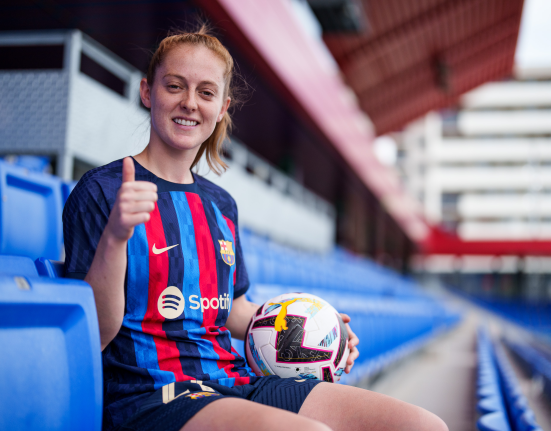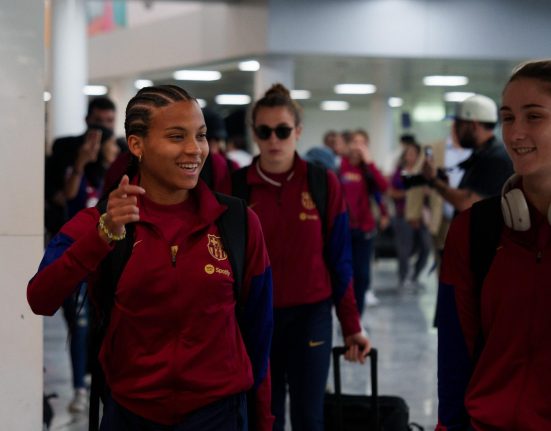Abdullah Abdullah is a tactical connoisseur and writer who now, having just published his fourth book unlocking the biggest teams in the women’s game, will begrudgingly accept being called an author. I spoke with him about how he writes, and his views on Barça Femení’s growing European profile.
Abdullah is known for taking even the most complicated tactics and laying them out in a way that is easy to read and easy for even casual football fans to understand – with as unique a set-up as Barça Femení has, Abdullah’s new book Rise of a New Dynasty: FC Barcelona Femini’s Emerging Legacy (Pitch Publishing) will hopefully stay true to form. Making the complex tactics of Jonatan Giráldez’s team much more accessible, after all, will only widen the appeal of Barça Femení.
On player development
The book isn’t only about the tactical side of Barça Femení, but Abdullah has a lot of praise for the way Jona has integrated tactics and player management. “It’s easy when you find a starting XI of players who are all used to playing under the (same) style of play”, Abdullah tells me, but even with La Masia, Barça doesn’t have it this easy; Abdullah finds that “the most effective part of (Jona’s) tactical structure is certainly his ability to garner a host of different profiles to thrive under the same system.”
Barça Femení has introduced backup players in new roles, and players with unique profiles. Abdullah highlights Ingrid Engen and Fridolina Rolfö as prime examples of players whose “key strengths” are being used at Barcelona, while they overall have developed significantly (including playing different positions), to make the team thrive.

And this all happened under Barça Femení’s system, almost a La Masia for grown-ups, who come into the club with desirable skills and a commitment to develop under its style and influence.
The actual La Masia, too, is something Abdullah considers vital to Barça Femení. Noting that “youth development is becoming a more crucial part of the women’s game” in general, he points to “developing youth players to help bridge the gap to certain profiles” and “be(ing) less reliant on needing to get outside players” – areas Barça Femení are arguably ahead of the curve in.
I’ve always argued that the profile of players needed at the very top is much smaller than the mid-low tier and while that pool is increasing year on year, you need to start developing youth players…
Abdullah Abdullah
Though his research for the book didn’t afford him much exposure to Barça Femení’s equally all-conquering B and C teams, Abdullah praises the quality of Martina Fernández – “a player who can thrive for the next few years with good development” – and the youth recruitment of the club. Barcelona managed to bring in the likes of Vicky López and Giulia Dragoni (the latter for a small nominal fee, one of few paid transfers into Barça Femení, but a sign that this emphasis on youth development could soon come at a price). Abdullah notes how the pair already have enough talent to contribute for the first team while they continue to develop, and “thus create a good core of players to create a dynasty.”
And ah, the dynasty. The central thought of Abdullah’s book. With their impressive results in Spain and Europe since 2019, Barça Femení are surely in the honeymoon phase of their hard-earned new dynasty.
On Barça and Lyon
Within European women’s football, there is really only one other dynasty to talk about, and that’s Olympique Lyonnais (Lyon), a team Abdullah already has a book about. Reflecting on how he’s grown as an author since then, he says that this first book about Lyon “still is one of (his) favourites”, but his inexperience as an author back then means there has been “a stark improvement in both (his) writing and style of the books.” With each of Abdullah’s books tackling a different team, each new subject “gave (him) a new idea and forced (him) to re-think the structure of the book so it wasn’t same-y for everyone to read.”
Taking cues from the teams being written about, their style, on how to structure his books gives the reader (myself, at least) an experience of reading each successive book that is as different as watching them all play. So both fans of Abdullah’s writing and those yet to read any of his work will be able to enjoy the books, even if they binge read them.

Abdullah’s detailed knowledge of Lyon means he can provide insights on how their legendary dynasty in Europe shapes up compared to Barça’s new dynasty. While Barça Femení is the main recipient of all the plaudits at the moment, and Abdullah says they are “probably the favourites to win” the Champions League again this year (“but Lyon cannot be discounted”), the French team still hold the Champions League record. Their presence in the game is undeniable. So is Barcelona’s: Abdullah thinks that, considering the bigger picture, “Barça and Lyon will be seen as equals when it comes to (…) dynasties” – though he doesn’t know how long it will be before this is the general assessment.
He waxes lyrical about the comparable domination and structural similarities between the two teams. Both squads have a core of players from the country if not region of their clubs – cores that, under the strong team identity, “uphold those standards (of club culture) across the squad and make sure that the new players understand what is needed.”
Both (Barcelona Femení and Olympique Lyonnais Féminin) are dominant teams looking to create and dominate the women’s game.
Abdullah Abdullah
Prompted for a difference between the teams, Abdullah says that Barça has “done a slightly better job” when it comes to giving younger players more regular game time as part of the integration process. And while Chelsea – the other domestic team Abdullah has a book about – is well on the way to having an imperious English dynasty, they “still have (to) get over the line and win the UWCL”, he says, “but they aren’t far off” being in the conversation of dominance alongside Lyon and Barça.
On Liga F
Teams that are further away from Barça include much of their Liga F competition. Abdullah says “it’s tough to see where and who Barça’s biggest rivals are”, but he has a lot of appreciation for Real Sociedad – tactically, under the management of Natalia Arroyo, he thinks they could pose Barça the biggest threat. He also admires Levante, saying he hopes these teams “step up to give competition” to Barça. The main problem they face in doing this is resources; Abdullah suggests that la Real would be a real challenge for Barcelona if they were better provided for. And, realistically speaking, the strength of resources means that the team most likely to step up and challenge Barça in a few years is Real Madrid.
As for the rivalry between Barça Femení and Real Madrid, Abdullah thinks that “from a brand (perspective) it makes sense.” It’s cultural heritage, at least: “Real (Madrid) vs Barça has always been the game in Spain”.
On history
Barça Femení’s identity of course goes much further than the teams they play. Like in some of his other work, Abdullah has gone right back to the start of Barça Femení (or, the ‘Barcelona City Team’, Selecció Ciutat de Barcelona) “to go back and see how they started(,) to really understand where they’ve reached now.” This new book begins with an overview of the team’s history, how Barça Femení relates to the slow growth of women’s football in Spain, and how their circumstances affected the way they grew and developed into the team they are now. Abdullah feels that showcasing the history is vital before being able to appreciate the present.
The club breeds those (Barça style, culture and mentality) qualities and it runs through the entire club.
Abdullah Abdullah
How quickly the ‘present’ becomes part of the evolving history: Abdullah dedicates a chapter of his book to the first era of Barça Femení’s new dynasty, the Lluís Cortés era of nigh-unwavering success that nevertheless can be considered as just one mountain. Conquering that one mountain teaches the adventurer what to do and not to do when hoping to scale the whole range.
Combining his experience in tactical writing with almost an investigation of the history can’t have been an easy task, but for that chapter, at least, Abdullah had the authoritative assistance of Cortés himself. They “chatted about (Cortés’s) team and some of the decisions he made behind his selections”, and for a good while. Unable to speak to anyone from the club at present (he doesn’t bore me with the details but it’s FC Barcelona, we get it), Abdullah felt his research and other work had been greatly validated by what he garnered from his conversation with Cortés; he’s not going to have put a foot wrong.

Another great help was the conversations Abdullah had with other people, saying that “collaboration (…) is super important” for him. “Collaborating at the right time” is a key to moving forward, both professionally and personally: “It doesn’t only elevate your work”, he says, “but you create good connections with people along the way. (…) You can only be as good as the community around you.”
Whether as a writer like Abdullah, or an intimate culture-focused team like Barça Femení, or even just as a human, that statement feels like it always rings true.






